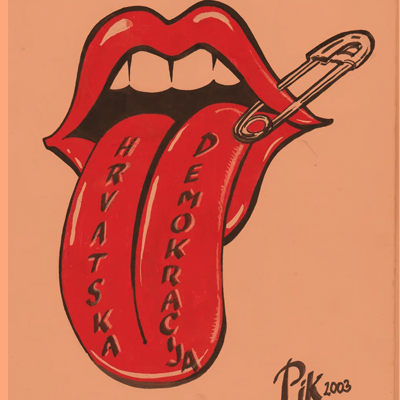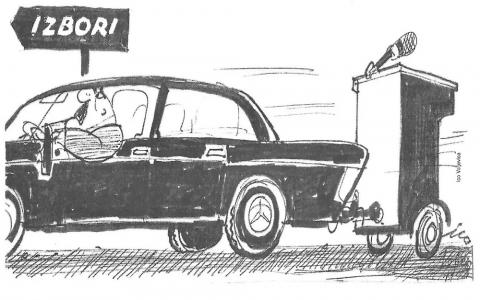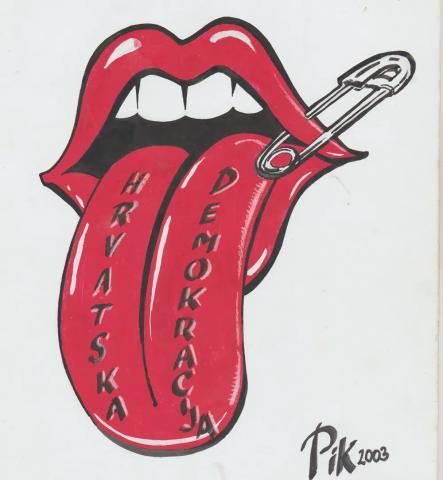
El chiste como forma de comunicación y de enviar mensajes políticos es utilizado por los políticos más exitosos, y entre los nuestros, la mayoría recuerda al chistoso Stipe Mesić, quien fue presidente de Croacia durante dos mandatos. Contó e inventó cientos de chistes y ocurrencias, y aquí va uno suyo de aquellos tiempos, cuando se encontraba de visita en la región de Stubica, donde la mayoría de los locales gastronómicos llevaban el nombre de Matija Gubec. Cuando se inauguró un establecimiento llamado “Tahy”, muchos se escandalizaron, pero Stipe dijo:
“¿Dónde se comía mejor? ¿En casa del pobre Gubec o en la del noble Tahy?”
Stipe Mesić, Jadranka Kosor y Winston Churchill
Mesić debe en gran parte su segunda victoria presidencial a sus chistes y burlas a costa de su contrincante Jadranka Kosor. Recordamos aquella frase humorística suya cuando dijo que ya tenía miedo de abrir una lata de paté porque de ella podría saltar Suzana, el apodo burlón con que se refería a su rival Jadranka.
Es interesante que Jadranka Kosor aprendió algo de esa derrota electoral, pues más tarde, ya como primera ministra, empezó a responder a las preguntas con ocurrencias. Recordamos su respuesta sobre su primo, quien criticaba al gobierno: “que no escupa en el plato del que come”, y a la oposición le respondió que “primero barriera su propia puerta”, reaccionando a las acusaciones sobre la implicación de un ministro en actos delictivos. Incluso en esa ocasión llevaba un broche en forma de escoba, lo que es una gran ocurrencia.
Más tarde surgió una caricatura interesante que mostraba al primer ministro esloveno Pahor y a Kosor besándose, y desde una foto colgada en la pared los observaba Ivo Sanader, quien había dimitido de su cargo como primer ministro, y comentaba:
“¡Qué fácil lo tienes, Jadranka, cuando continúas justo donde yo lo dejé!”
Por supuesto, también en el mundo hay políticos que saben reírse, incluso de sí mismos. Una de las frases más conocidas es de Winston Churchill, quien comentó sobre su afición al alcohol:
“He tomado más del alcohol que lo que el alcohol ha tomado de mí.”
En Croacia, el aforismo es una forma de humor altamente desarrollada para burlarse de los políticos y el poder. Solo mencionemos que en 2022 se publicaron en Croacia 25 libros de aforismos, ninguno con apoyo estatal.
Nuestro aforista Danko Ivšinović dijo en uno de sus aforismos que el 10% de los croatas viven como riñones en manteca, y el resto está en diálisis. Dado el creciente empobrecimiento, Croacia deberá aumentar el número de máquinas de diálisis, y ese 10% de “riñones en manteca” está cayendo drásticamente con las últimas acciones de la oficina anticorrupción USKOK.
Tomislav Supek dice que la madeja del robo en la Cámara de Economía y en la de Carreteras comenzó a desenredarse desde la cola, en lugar de por la cabeza. Claro que ahora todos quieren convertirse en “arrepentidos”. Qué “conmovedoras” suenan las palabras de aquellas dos protagonistas del caso Fimi Media que en el tribunal lamentaban haber avergonzado a sus familias, pero no que nos hayan empobrecido en cientos de millones de kunas.
El gobierno nos pide un poco más de aguante, que el próximo año será mejor, pero el aforista Živko Prodanović dice que es difícil para un pobre cargar con el optimismo ajeno. Quizá el Parlamento también debería reaccionar, pero como dice Dražen Jergović, ellos siempre enlazan festivos y fines de semana, y en el hemiciclo se comportan como hipopótamos: raramente se les ve y suelen bostezar.
Con la risa también se puede ganar dinero, aunque no es una oportunidad para quienes la crean, sino para aquellos cercanos al poder que saben cómo ganar con tu alegría. La sociedad de autores ZAMP, vinculada a Josipović, cobra cientos de euros por cada fiesta de carnaval, aunque participen solo niños. En los carnavales se cantan tradicionalmente canciones populares de siglos pasados, de autor anónimo, pero hoy generan ingresos para los políticos-divertidores. La risa y la alegría son buena fuente de ingreso para quienes logran impulsar leyes como la del impuesto al carnaval.
Un refrán judío moderno dice:
“Mejor que los rusos cierren el gas, a que lo abran los alemanes.”
Tristemente risibles son también algunos de nuestros políticos que tratan de justificar con lógica la “operación” rusa, al igual que aquellos manifestantes de la antigua Alemania Oriental que, por miedo “existencial”, invocan a Rusia, olvidando las casi cinco décadas vividas bajo su bota. ¿O acaso la Stasi sigue activa?
Y al final, una frase que encaja perfectamente con nuestra sarcástica vida cotidiana:
“Cuando estoy borracho, todos lo ven; cuando tengo sed, nadie.”
Escrito por Dragutin Lončar, periodista, publicista y editor, periodista de larga trayectoria en las publicaciones del antiguo grupo editorial Vjesnik (Vjesnik, Sedam dana, Danas, Arena…) y desde hace un cuarto de siglo periodista independiente, además de editor y editor del periódico humorístico-satírico croata “Potepuh”.


Humor in Croatia | Laughter in politics
by Dragutin Lončar
Jokes as a form of communication and political messaging are used by more successful politicians, and among ours, most remember the joke-teller Stipe Mesić, who served two terms as President of Croatia. He told and invented hundreds of jokes and witticisms, and here’s one of his original ones from the time when he visited the Stubica region, where most hospitality venues were named after Matija Gubec. When a place named “Tahy” opened, many were scandalized, but Stipe said:
“Where was the food better? At poor Gubec’s or at noble Tahy’s?”
Stipe Mesić, Jadranka Kosor and Winston Churchill
Mesić largely owes his second presidential election victory to his jokes and jabs at his rival, Jadranka Kosor. We remember his humorous remark that he was already afraid to open a can of pâté because Suzana might jump out of it — Suzana being his mocking nickname for Jadranka.
Interestingly, Jadranka Kosor learned something from that electoral defeat. Later, as Prime Minister, she often answered questions with witty remarks. We remember her reply about her cousin who criticized the government — “don’t spit into the plate you eat from” — and her response to the opposition, telling them to “sweep in front of their own doorstep first” when accused of ministerial involvement in criminal activity. She even wore a brooch shaped like a broom — a first-class pun.
Later, an amusing caricature appeared showing Slovenian Prime Minister Pahor and Kosor kissing, while a picture of Ivo Sanader — who had resigned from the premiership — looks down on them from the wall and says:
“Easy for you, Jadranka, you’re just picking up where I left off!”
Of course, there are politicians worldwide who knew how to joke, even at their own expense. One of the most famous quotes comes from Winston Churchill, who commented on his fondness for alcohol:
“I have taken more out of alcohol than alcohol has taken out of me.”
In Croatia, aphorisms are one of the most developed forms of political and government mockery. Just consider that in 2022, 25 books of aphorisms were published in Croatia — none with state support.
Our aphorist Danko Ivšinović once said in an aphorism that 10 percent of Croats live like a kidney in fat, and the rest are on dialysis. Given the increasing poverty, Croatia will need more dialysis machines, and that 10 percent of “fatty kidneys” is shrinking rapidly thanks to recent USKOK (anti-corruption office) actions.
Tomislav Supek said that the tangle of theft, especially years ago in the Croatian Chamber of Economy and the Highways Authority, started to unravel from the tail instead of the head. Of course, now everyone wants to become a whistleblower. How “touching” sound the words of the two women involved in the Fimi Media scandal, who mostly complained in court about having shamed their families — but not that they had impoverished us by hundreds of millions of kunas.
The government asks us to hang on a little longer, promising that next year will be better. But aphorist Živko Prodanović says that it’s hard for the poor to carry someone else’s optimism on their back. Maybe Parliament should wake up too — but as Dražen Jergović says, they’re always linking holidays and weekends, and in the chamber they behave like hippos: rarely seen and constantly yawning.
You can make a good living from laughter — though not if you're the one creating it. Those close to politicians and power know how to profit from your joy. Josipović’s ZAMP (music rights organization) takes several hundred euros from every carnival event, regardless of whether adults or children participate. These events typically feature old carnival songs composed centuries ago, with unknown authors even then — but today, it’s politician-entertainers who profit. Laughter and joy are a good income source for those who know how to pass a law taxing carnivals.
A recent Jewish proverb says:
“Better for the Russians to shut off the gas than for the Germans to turn it on.”
Some of our noble politicians are laughably sad — trying to rationalize the Russian “operation” — as are those former East German protesters who, out of “existential fear”, call on Russia for help, forgetting the nearly fifty years they lived under the Russian boot. Or is the Stasi still in operation?
And finally, a saying that perfectly fits our sarcastic everyday life:
“When I’m drunk, you all see it; but when I’m thirsty, no one does.”
Written by Dragutin Lončar, journalist, publicist, and publisher, long-time reporter and editor with the former Vjesnik publishing house (Vjesnik, Sedam dana, Danas, Arena…), and for the last quarter century, an independent journalist and editor-publisher of the Croatian humor-satirical magazine “Potepuh”.
(This text has been translated into English by ChatGPT)
